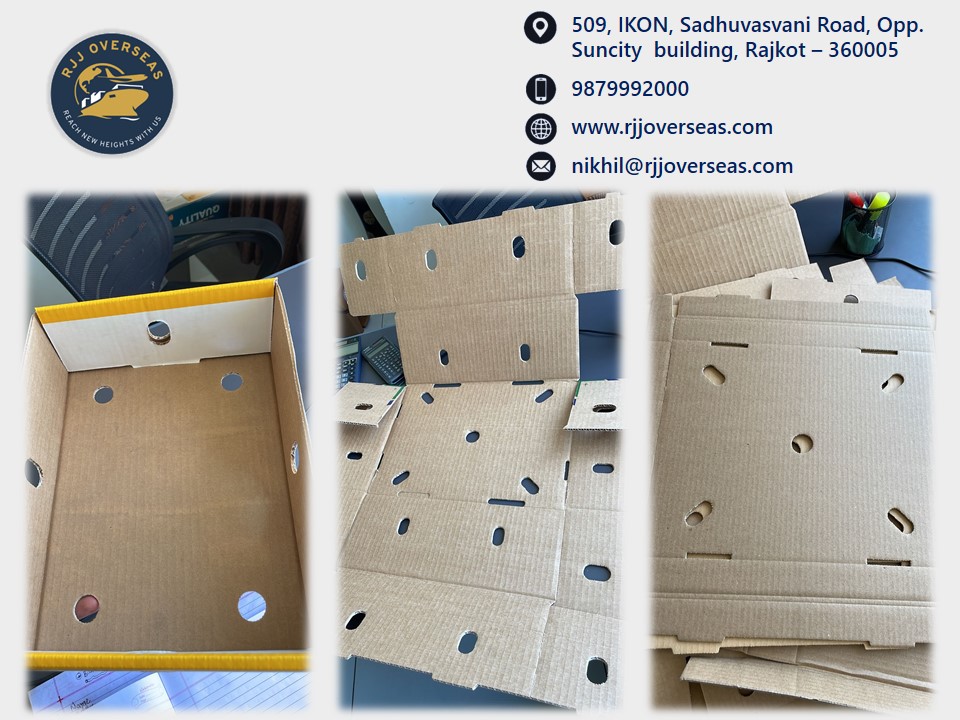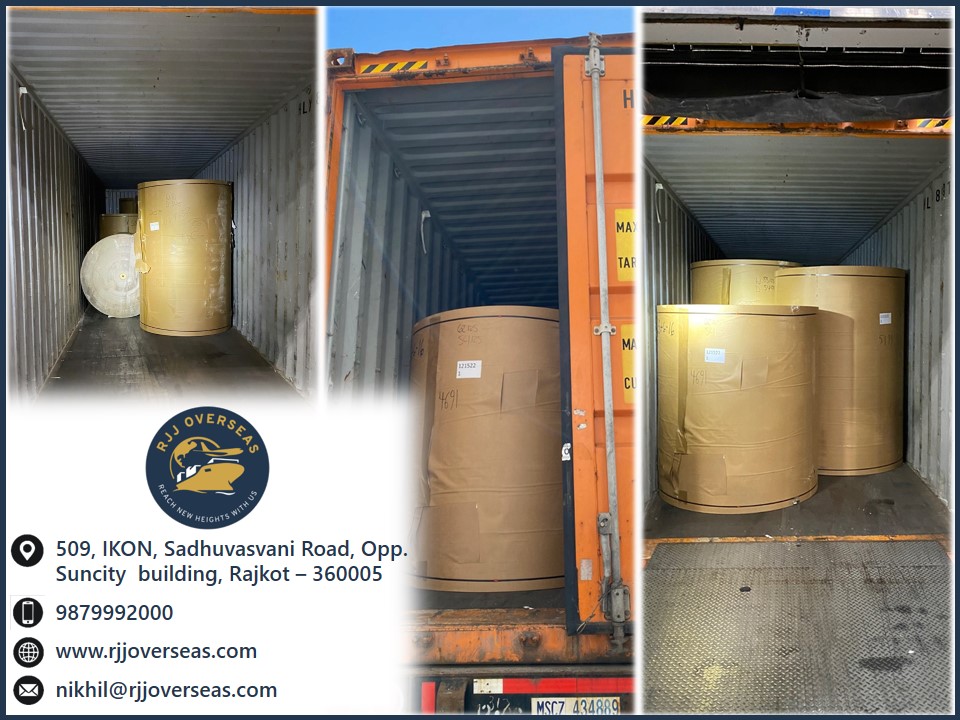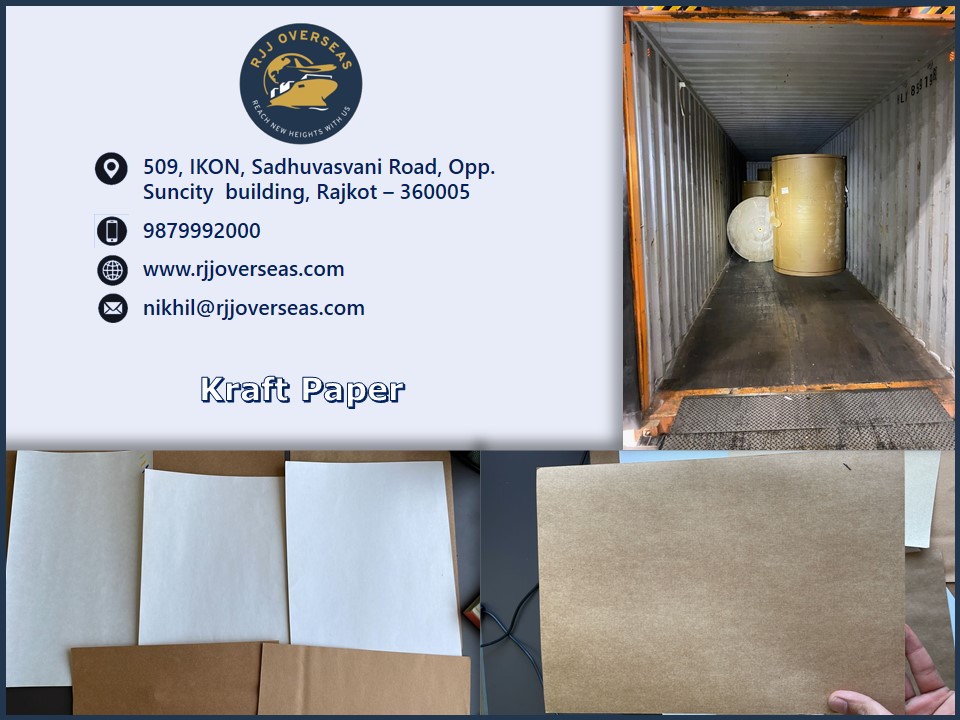Introduction:
In recent years, India's packaging industry has undergone a significant transformation due to the surging demand for high-quality packaging materials. A notable trend in this sector is the increasing imports of Kraft liner boards and white top liners from Austria, Canada, and Germany. This blog explores the reasons behind India's growing imports and the benefits they bring to the packaging industry.

Importance of Packaging Materials:
The Crucial Role of Packaging Materials in Various Industries
Packaging materials play a vital role in industries such as food and beverages, pharmaceuticals, consumer goods, and e-commerce, ensuring product safety, transportation efficiency, and brand image.
Packaging materials are essential across various industries, serving critical functions. Firstly, they directly impact product safety by providing a protective barrier against external factors, ensuring product integrity and consumer well-being. Additionally, high-quality packaging materials contribute to transportation efficiency through optimized loading, stacking, and secure transportation, minimizing damage risks and improving logistics. Moreover, packaging materials significantly influence brand image by creating a visually appealing presentation that attracts consumers and communicates product quality. It is crucial to prioritize the use of durable, sustainable, and aesthetically pleasing packaging materials to meet consumer demands effectively. Sustainable packaging options also align with growing consumer preferences for eco-friendly choices, enhancing brand reputation and customer loyalty.
Conclusion:
Packaging materials play a crucial role in ensuring product safety, transportation efficiency, and brand image. Using durable, sustainable, and visually appealing materials is essential to meet consumer demands effectively.

Market Overview:
India's packaging industry has experienced rapid growth, driven by an expanding consumer base and increased demand for packaging materials. However, domestic manufacturers face challenges in meeting this demand, making international collaborations crucial.
Overview of India's Packaging Industry
India's packaging industry has witnessed significant growth due to factors such as urbanization, rising disposable income, and e-commerce expansion. The market demand for packaging materials, including Kraft liner board and white top liners, has been steadily increasing. Domestic manufacturers, while striving to meet these demands, often face challenges such as limited technological capabilities, inadequate infrastructure, and inconsistent quality.
The Role of International Collaborations
International collaborations between Indian importers and suppliers from countries like Austria, Canada, and Germany provide a solution to bridge the supply-demand gap. These collaborations offer access to high-quality packaging materials, advanced technologies, and expertise. Importers can tap into the expertise of established international suppliers to enhance their product offerings and cater to the diverse needs of the Indian market.
International collaborations are instrumental in addressing the challenges faced by domestic manufacturers, helping to fulfill the increasing demand for packaging materials in India's growing market.
Advantages of Kraft Liner Board and White Top Liner:
Kraft liner board and white top liner offer a range of advantages that make them highly sought-after packaging materials.
Superior Strength and Durability: These materials are known for their exceptional strength and durability, providing robust protection for packaged goods during handling, transportation, and storage. They can withstand various stresses and impacts, reducing the risk of product damage.
Versatility: Kraft liner board and white top liner are versatile materials suitable for a wide range of packaging applications across industries. They can be used for corrugated boxes, folding cartons, displays, and other packaging formats, accommodating different product shapes and sizes.
Excellent Printability: These materials provide a smooth surface that enables high-quality printing, enhancing brand visibility and shelf appeal. They allow for vibrant colors, sharp graphics, and precise text, helping products stand out in a competitive market.
Moisture Resistance: Kraft liner board and white top liner offer good resistance to moisture, preventing water absorption and maintaining the integrity of packaged goods. This feature is especially crucial for products that are sensitive to moisture or require protection during transit or storage.
Protection Against External Factors: These materials provide a protective barrier against external factors such as light, dust, and contaminants. They help safeguard products from environmental influences and maintain their quality and freshness.
Overall, the superior strength, durability, printability, moisture resistance, and protection against external factors make Kraft liner board and white top liner ideal choices for a wide range of packaging applications, ensuring the integrity and visual appeal of packaged goods.
Quality Assurance and Compliance:
Austrian, Canadian, and German manufacturers in the packaging industry adhere to stringent quality standards and certifications, prioritizing sustainability and responsible sourcing. These countries have established a reputation for maintaining high-quality products and complying with international regulations.

Quality Standards and Certifications: Manufacturers from Austria, Canada, and Germany follow rigorous quality control processes and hold certifications such as ISO 9001 and ISO 14001. These certifications ensure consistent product quality, efficient manufacturing practices, and compliance with environmental management standards.
Sustainability and Responsible Sourcing: These countries place a strong emphasis on sustainability in the packaging industry. Manufacturers implement sustainable practices, such as using renewable and recyclable materials, reducing carbon footprint, and minimizing waste generation. They prioritize responsible sourcing by ensuring the traceability and ethical production of raw materials.
Compliance with International Regulations: Austrian, Canadian, and German manufacturers adhere to international regulations and industry standards, such as REACH (Registration, Evaluation, Authorization, and Restriction of Chemicals) and RoHS (Restriction of Hazardous Substances). Compliance with these regulations ensures that imported packaging materials meet safety and environmental requirements.
Benefits of Importing from Established Suppliers: Importing from reputable suppliers in these countries offers several advantages. Established suppliers have a track record of consistent product quality, reliability, and adherence to environmental standards. Importers can have confidence in the performance and reliability of the materials they receive, contributing to the overall satisfaction of their customers. Furthermore, partnering with reputable suppliers facilitates access to the latest technological advancements, innovation, and industry expertise, enhancing the competitiveness of the importing businesses in the market.
Importing from Austrian, Canadian, and German manufacturers provides the assurance of high-quality packaging materials that meet stringent quality standards, prioritize sustainability, and comply with international regulations. This enables businesses to align with environmental goals, meet customer expectations, and differentiate themselves in the market.
Technological Advancements:
Manufacturers in Austria, Canada, and Germany employ cutting-edge technologies to produce high-quality packaging materials, offering innovative solutions to meet the evolving needs of Indian consumers. These advancements contribute to superior packaging solutions in terms of performance, aesthetics, and functionality. Importing from these countries allows Indian businesses to access these advanced technologies and provide exceptional packaging options to their customers.
Advanced Coating Techniques: Manufacturers utilize state-of-the-art coating technologies to enhance the properties of packaging materials. Advanced coating techniques, such as extrusion coating and laminating, improve moisture resistance, barrier properties, and durability. These coatings can also provide specific functionalities like heat sealability, oxygen barrier, and UV protection, expanding the application possibilities of packaging materials.
Improved Fiber Blends: Continuous research and development efforts focus on optimizing fiber blends used in packaging materials. By blending different types of fibers, manufacturers can achieve desired characteristics such as strength, flexibility, and eco-friendliness. These improved fiber blends contribute to the production of packaging materials that offer excellent performance while minimizing environmental impact.
Enhanced Printing Capabilities: Manufacturers leverage advanced printing technologies, such as high-resolution flexographic and digital printing, to achieve superior print quality. These capabilities enable detailed graphics, vibrant colors, and intricate designs, enhancing the visual appeal of packaging materials. Furthermore, technologies like variable data printing allow for personalized packaging, catering to the growing demand for customized consumer experiences.
By importing from manufacturers in Austria, Canada, and Germany, Indian businesses gain access to these cutting-edge technologies and innovations. This enables them to offer high-quality packaging materials that meet the evolving needs and expectations of Indian consumers. The use of advanced coating techniques, improved fiber blends, and enhanced printing capabilities ensures packaging solutions that provide durability, protection, aesthetics, and customization options, ultimately enhancing the value proposition for importers and their customers.
Collaborative Partnerships:
Successful partnerships between Indian importers and international suppliers have yielded numerous benefits for Indian businesses in the packaging industry. These collaborations have improved product availability, fostered knowledge exchange, and promoted technology transfer, resulting in significant positive impacts on the Indian packaging industry.
Enhanced Product Availability: Partnering with international suppliers ensures a consistent and diverse range of high-quality packaging materials for Indian importers. This enables them to meet the growing demands of the Indian market and cater to various industry sectors effectively. Access to a wider range of packaging options allows importers to offer their customers innovative and specialized solutions, thereby increasing their competitiveness.
Knowledge Exchange: Collaborations with global manufacturers facilitate knowledge exchange between Indian importers and their international partners. This exchange of expertise, industry insights, and best practices allows importers to gain valuable knowledge about the latest trends, technologies, and techniques in the packaging industry. This knowledge transfer enhances the capabilities of Indian businesses, enabling them to improve their product offerings and stay ahead in a rapidly evolving market.
Technology Transfer: Successful partnerships often involve the transfer of advanced technologies from international suppliers to Indian importers. This transfer of technology enables importers to enhance their manufacturing processes, improve product quality, and increase operational efficiency. For instance, collaborations may involve the adoption of advanced printing techniques, automation systems, or sustainable manufacturing practices, allowing Indian importers to produce packaging materials that meet international standards and customer expectations.
Examples of successful partnerships include Indian importers collaborating with established packaging manufacturers from Austria, Canada, and Germany. These collaborations have led to the introduction of advanced technologies, innovative product solutions, and improved supply chain management practices in the Indian packaging industry. Such partnerships have contributed to the overall growth and development of the Indian packaging sector, positioning it as a competitive player in the global market.
In conclusion, successful partnerships between Indian importers and international suppliers have brought numerous benefits to Indian businesses in the packaging industry. These collaborations have improved product availability, fostered knowledge exchange, and facilitated technology transfer. By leveraging the expertise and resources of global manufacturers, Indian importers have been able to enhance their product offerings, expand their market reach, and drive innovation in the Indian packaging industry.
Market Opportunities:
India's packaging industry possesses vast untapped potential and promising growth prospects. The industry is witnessing increasing demand for eco-friendly and sustainable packaging solutions, driven by growing consumer awareness and government regulations promoting environmental sustainability.
Consumer Awareness: Indian consumers are becoming more conscious of the environmental impact of packaging materials. They are actively seeking products packaged in eco-friendly materials and favor brands that prioritize sustainability. This shift in consumer preferences presents a significant opportunity for Indian importers of Kraft liner board and white top liner, as these materials are known for their recyclability and sustainability attributes.
Government Regulations: The Indian government has implemented regulations and policies to promote sustainable packaging practices. For instance, initiatives like the Plastic Waste Management Rules and Extended Producer Responsibility (EPR) regulations encourage the use of environmentally friendly packaging materials and incentivize businesses to adopt sustainable packaging solutions. Importers of Kraft liner board and white top liner can leverage these regulations to offer compliant and sustainable packaging options to their customers.
Diverse Market Segments: The demand for packaging materials in India extends across various market segments, including food and beverages, pharmaceuticals, e-commerce, and personal care. Each segment has unique packaging requirements, providing importers with opportunities to cater to diverse customer needs. Kraft liner board and white top liner offer versatility and customization options, making them suitable for a wide range of packaging applications.
Competitive Advantage: Importing high-quality Kraft liner board and white top liner from established suppliers in Austria, Canada, and Germany gives Indian businesses a competitive advantage. These materials offer superior strength, durability, and printability, meeting the evolving demands of Indian consumers. By offering sustainable and aesthetically appealing packaging solutions, importers can differentiate themselves in the market and gain a competitive edge.
To seize these growth opportunities, Indian importers should focus on building strong partnerships with international suppliers known for their expertise in sustainable packaging solutions. They should stay updated on industry trends, consumer preferences, and regulatory requirements to align their offerings accordingly. By offering eco-friendly packaging materials like Kraft liner board and white top liner, importers can cater to the increasing demand for sustainable packaging solutions and capture a significant share of the growing market.
In conclusion, India's packaging industry holds untapped potential and promising growth prospects, driven by increasing demand for eco-friendly and sustainable packaging solutions. Indian importers of Kraft liner board and white top liner can capitalize on these opportunities by understanding consumer preferences, complying with government regulations, and offering customized packaging solutions to diverse market segments.
Conclusion:
India's rising imports of Kraft liner board and white top liner from Austria, Canada, and Germany are revolutionizing the packaging industry. These collaborations offer advantages such as superior packaging materials, enhanced printability, and protection, as well as sustainability and responsible sourcing. Importing from these countries helps meet consumer demands, promotes sustainable practices, and ensures compliance with international regulations. The partnerships facilitate knowledge exchange, technology transfer, and access to advanced manufacturing techniques. Indian importers are encouraged to explore collaborations with international suppliers to elevate the packaging industry, cater to consumer needs, and drive sustainable innovation. Together, they can reshape the industry and create a brighter future for packaging in India.